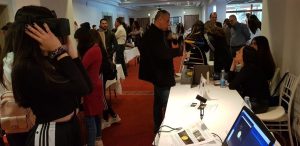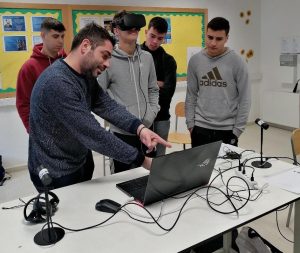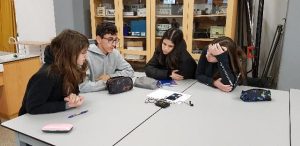
From January 27th until March 4th 2020, RISE’s EdMEdia group (http://www.rise.org.cy/engb/research/research-groups/interactive-media-and-education/) and the Cyprus Interaction Lab (https://www.cyprusinteractionlab.com/) worked with more than 140 high school students in Cyprus to enable innovative learning experiences in Physics lessons.
The students engaged in an inquiry using a VR simulation, with a mission to answer questions related to the Special Theory of Relativity. Immersive VR allowed the students to make several space travels and understand physical phenomena such as time dilation and the length contraction.
The research team aimed to demonstrate learning design for successful integration of VR technologies in real classroom settings.
The educational activity took place at the following high schools with the support of the schools’ principals and Science Education teachers:
• Petrou & Pavlou Lyceum, Limassol (Marios Ioannou, Michalis Ioannou, Petros Lofitis)
• Apostolou Louca Lyceum, Limassol (Maria Theophanous, Demetra Hadjichambi, Nikolas Shikkis, Andreas Falkonidis, Olga Nicolaidou)
• Agiou Ioanni Lyceum, Limassol (Sylvia Economidou, Nikolas Nikolaou, Symeon Symeou)
• Kykkou B Lyceum, Nicosia (Panayiota Chrysoxou-Anastasiadou, Dionysis Apostolides, Argiro Costi, Demetra Tziakouri)
• Pascal Private School, Nicosia (Pantelis Andreou, Piera Ekkeshi-Meletiou)
The students expressed their enthusiasm for the inquiry-based learning experience and for the use of the VR simulation, which allowed them to study the Special Theory of Relativity in a more fun, experiential and interactive way.
Enjoy snapshots of the experience https://www.youtube.com/watch?v=F9Q0W6BUR1I
A further showcase of the experience took place at the 9th Conference of Positive Sciences for Teachers and Students, which took place on 6-8 March 2020, at the Coral Beach Hotel & Resort at Paphos. During the conference, more than 100 hundred students and their teachers from 15 secondary education schools from all over Cyprus were excited to use the VR simulation on Special Theory of Relativity.






